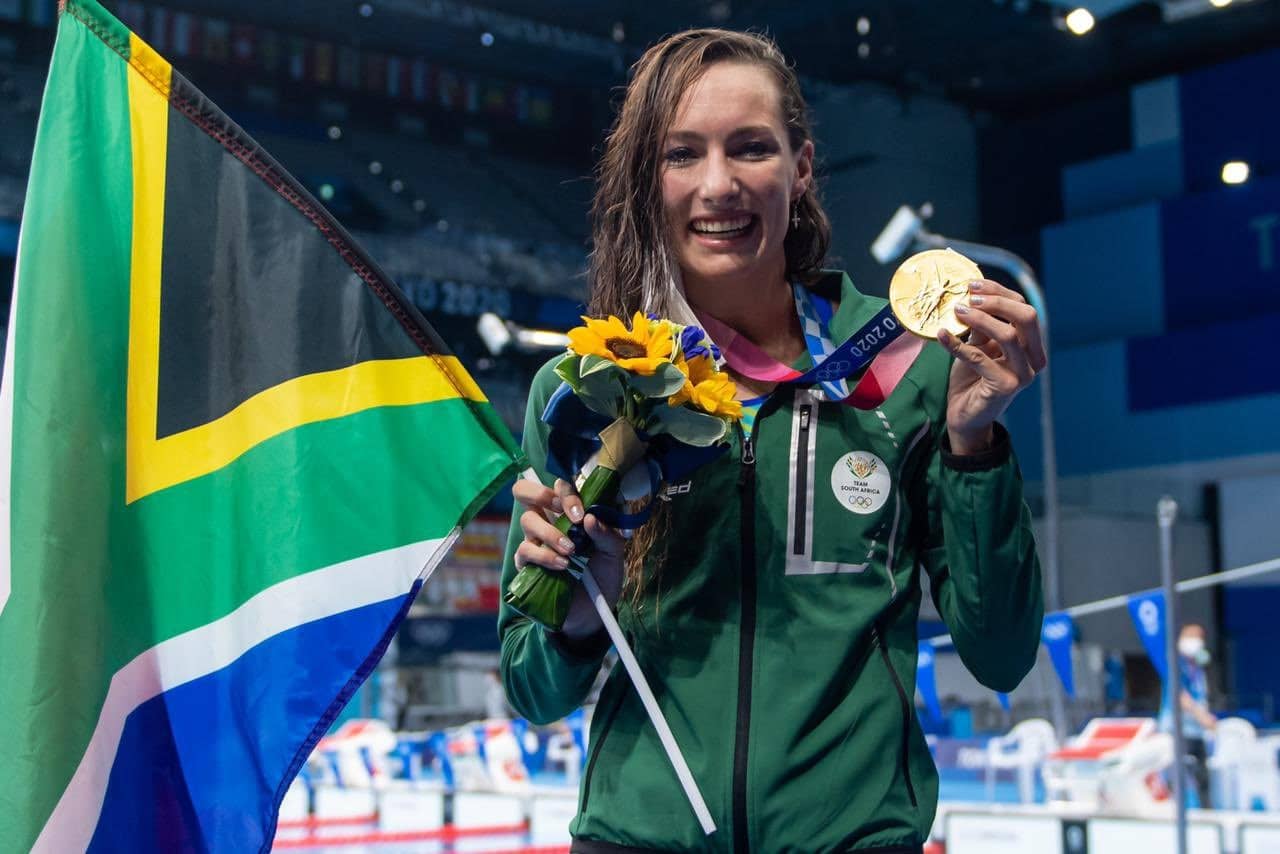Tatjana Schoenmaker triumphed in the greatest women’s 200m breaststroke race of all time. On the biggest stage. In world record time. It doesn’t get better than that.
The South African superstar beat the American Lilly King in a titanic struggle, finally breaking her opponent’s resolve in the final 50m to touch the wall in 2min 18.95sec.It was the first time a woman had dipped under 2:19 in the 200m breaststroke.
In doing so, Schoenmaker claimed her country’s first gold medal at the Tokyo 2020 Olympics, pushing the medals tally up to three, herself winning two of them after a silver in the 100m breaststroke. She also followed fellow South African breaststrokers Penny Heyns and Cameron van der Burgh into the Olympic Hall of Fame, after they won gold in the 1996 and 2012 Games’.
The previous world record of 2:19.11 had been set by Denmark’s Ricke Moller Pedersen in Barcelona almost eight years ago to the day. Here, Schoenmaker carved 0.16 sec off that time.
Back on Planet Earth, Schoenmaker’s training partner Kaylene Corbett also performed heroically, finishing fifth in 2:22.06, which was a personal best in three consecutive swims. She will leave Tokyo emboldened by swimming the fastest three swims of her life when it counted. And Rocco Meiring will quietly reflect on the greatest moment of his coaching career.
King, the precocious American who had predicted that US swimmers could win every women’s gold medal in the pool, played a huge part in the race, having taken the field along from lane two in world record pace for the first 100m.
It was apparent almost from the moment that the swimmers left the blocks that this would be a Schoenmaker-King 1-2. It had a sort of Lewis Hamilton-Max Verstappen feel to it. It just depended on where your allegiances lie but Schoenmaker had made no secret of the fact that she was here for the 200m. Her 100m silver had been a bonus and while she publicly expressed her delight at the medal and repeatedly said, “I’m just happy to be at the Olympics,” don’t believe that.
Under that persona is a fierce competitor who would have privately thought she could win double gold, especially after lowering the Olympic record to 1:04.82 in the 100m heats. That she went slower in the final and won silver will have stung her, despite her public utterances.
In the 200m though she checked into the Tokyo Olympic “bubble” as the world No1, the Commonwealth Games champion and the clear favourite. And having earned lane four for the final there was no place to hide. Credit to her, she wasn’t about to.
King pulled the field through 50m in 31.27 with Schoenmaker turning in 31.64. The Russian Evgeniia Chikunova, who coach Meiring had described he was “worried about” heading into the competition, was third early on. Corbett meanwhile couldn’t go with the early speed and was eighth.
KIng remained under world record pace through halfway (1:06.47), with Schoenmaker second in 1:07.06. When you consider that trailblazer Penny Heyns had won the 100m breaststroke gold medal at Atlanta 1996 in 1:07.73 you can see how hot this race was.
The Russian was still third at halfway but over a second down.
Schoenmaker was always expected to get stronger in the second half of the race and so it proved as she kept her stroke together and pulled alongside King, and then ahead, as they turned at the 150m in 1:42.48 and 1:42.57, respectively. The race for bronze meanwhile was happening two seconds further behind.
Over the final 50m the South African pulled at the clear water in front of her as King was unable to keep up with the relentless world record pace. One can only imagine what the atmosphere would have been like had these Games been Covid-19 free and with a full house in the Tokyo Aquatics Centre. Roof? What roof.
That will be the only regret, but it matters not. Tatjana Schoenmaker won gold in the fastest women’s 200m breaststroke race of all time. King played a full part in the occasion, but eventually was beaten by 0.97 while American Annie Lazor came on late for the bronze, followed by Chikunova and a charging Corbett. That’s the Twitter report. But it was so much more than than.
Photo: Anton Geyser





